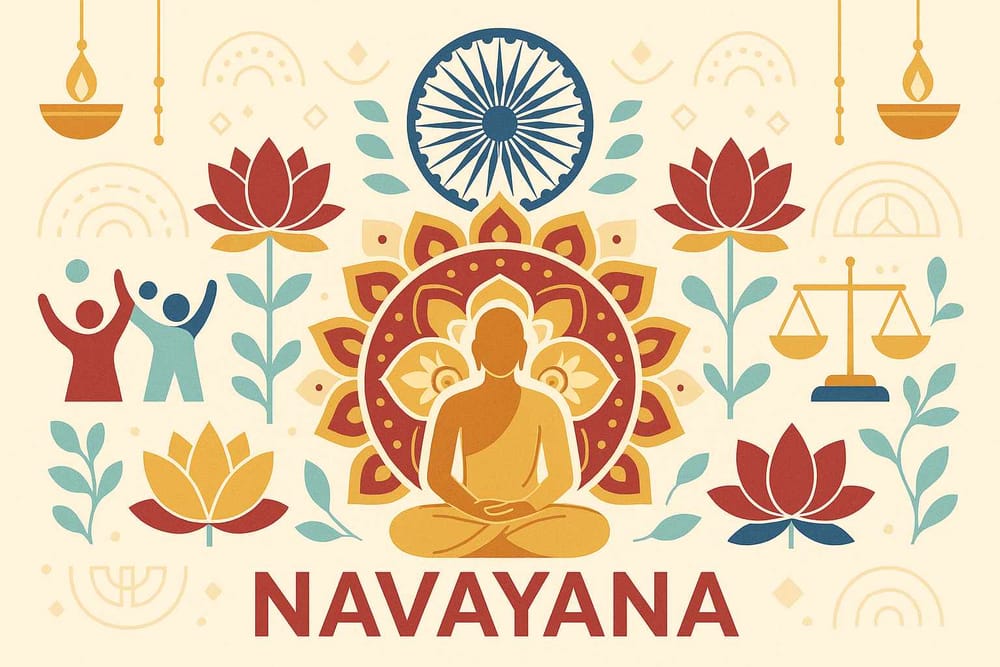
The Unexplored Legacy of Navayana- A Modern Interpretation Reveals Its Relevance
Have you ever felt that spirituality should be more than just personal peace? That it should have the power to heal not just our souls, but our society too? In the heart of India, a land of countless spiritual paths, a new vehicle—a ‘Nava-yana’—was created, not just to seek enlightenment, but to spark a revolution of dignity and equality. This is the story of Dr. B.R. Ambedkar’s profound gift to us: Navayana Buddhism, a path designed for the modern world.
What is Navayana, Really? A Path Away from Old Chains
The term ‘Navayana’ itself means the “New Vehicle.” Imagine our ancient spiritual traditions as different paths up a mountain. Dr. Ambedkar, or Babasaheb as we respectfully call him, saw that for millions of people, especially the Dalits, the existing paths were blocked by the giant boulders of caste discrimination and inequality. He realised that a new path was needed—one that was not about escaping this world, but about transforming it.
So, in 1956, in a historic moment in Nagpur, he, along with hundreds of thousands of his followers, embraced this new form of Buddhism. This wasn't just a religious conversion; it was a powerful declaration of human dignity. It was a way to break free from the oppressive chains of the caste system that had caused suffering for centuries. Babasaheb envisioned a society built on the democratic ideals of liberty, equality, and fraternity, and he saw Buddhism, in its most rational and ethical form, as the perfect foundation for it.
The Heart of Navayana Philosophy: Justice and Reason
Many people wonder how Navayana differs from the traditional forms of Buddhism they might know, like Theravada or Mahayana. The difference is truly groundbreaking and speaks volumes about Babasaheb's practical genius.
- Focus on Social Suffering: While traditional Buddhism teaches that the root of all suffering is desire, Ambedkar reinterpreted this. He argued that in our world, a huge part of human suffering comes directly from social injustices like the caste system. For him, spirituality had to address this real-world pain first.
- A Rational and Ethical Path: Navayana sets aside metaphysical concepts like karma (as a justification for one's birth station), rebirth, and complex rituals. Instead, it places immense importance on rational thinking, scientific temper, and ethical conduct in *this* life. The focus is on creating a just society here and now, not on accumulating merits for a future life.
- The 22 Vows: To make this break from the old ways clear and decisive, followers of Navayana take 22 vows. These vows are a powerful commitment to reject Hindu deities and caste-based beliefs, and to embrace an egalitarian worldview guided by the teachings of the Buddha and Babasaheb.
This approach makes Navayana a uniquely "socially engaged Buddhism." It’s not a path for hermits in caves, but for active citizens working to build a better, more compassionate world for everyone.
A Living, Breathing Legacy of Empowerment
The legacy of Navayana is not just written in books; it lives in the hearts and actions of millions. It has empowered marginalized communities, giving them a new identity rooted in self-respect and equality. It has inspired countless people to pursue education, engage in activism, and build supportive communities that challenge oppression head-on.
This movement is a powerful example of how spiritual traditions are not static relics but can be reinterpreted to provide answers to modern problems. It shows how storytelling and new interpretations can sustain and invigorate our spiritual traditions, making them relevant for generations to come. The message of Navayana is more important today than ever before, as we continue to grapple with issues of discrimination and inequality.
Is Navayana Only for India?
While born from the Indian experience, the principles of Navayana resonate globally. Its unwavering focus on human rights, social justice, and rational thought connects with movements fighting against racism, economic disparity, and systemic oppression all over the world. It offers a spiritual framework that isn't bound by culture, but by a universal desire for a just and equitable world. It serves as a powerful reminder that true spirituality must always walk hand-in-hand with compassion and action.
The Enduring Light of a Modern Path
Dr. B.R. Ambedkar’s Navayana is a timeless gift. It teaches us that faith and reason, spirituality and social justice, can and must coexist. It is a bold, compassionate, and practical path for anyone who believes in creating a world where every single person is treated with dignity.
Its legacy is still being written, often quietly and away from the mainstream spotlight, which is perhaps why it feels unexplored to many. But its relevance shines brightly, offering hope and a practical framework for building a more inclusive future for all of us.
Here at Bhaktilipi, we believe in the power of such profound stories. Our mission is to preserve and share the timeless wisdom of India’s devotional and spiritual literature. We are a digital space where you can explore these rich narratives, reimagined for today's world. Much like Navayana provides a modern vehicle for ancient wisdom, we strive to be a platform that connects you to your spiritual roots in a way that inspires and resonates with your life today.
Come, explore the depths of bhakti with us. Discover tales of wisdom, poetry of the heart, and sacred texts that have guided generations. Subscribe to our newsletter or follow us on our social channels to continue this beautiful journey.
A passionate group of people dedicated to preserving India's knowledge of Dharma, Karma, and Bhakti for ourselves and the world 🙏.
